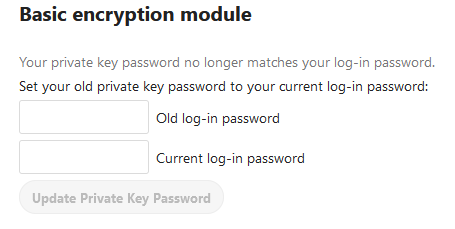Nextcloud version (eg, 18.0.2): 20.0.2 - 20.0.2.2
Operating system and version (eg, Ubuntu 20.04): Linux 4.15.0-126-generic #129-Ubuntu SMP Mon Nov 23 18:53:38 UTC 2020 x86_64
Apache or nginx version (eg, Apache 2.4.25): Apache/2.4.29 (Ubuntu) (apache2handler)
PHP version (eg, 7.1):
The issue you are facing:
I just installed nextcloud via Cloudron and I enabled the encryption module. Now whenever I log in, I see this error message
I have tried to change and reset my password several times and reset the encryption key here 
However, whenever I do so, I notice in the console logs this error message
14:05:33.889 $ is deprecated: The global jQuery is deprecated. It will be updated to v3.x in Nextcloud 21. In later versions of Nextcloud it might be removed completely. Please ship your own. 3 globals.js:60:15
14:05:33.897 XHRPOSThttps://cloud.xxxxxxxx/apps/encryption/ajax/updatePrivateKeyPassword
[HTTP/2 503 Service Unavailable 521ms]
14:05:34.422 Uncaught SyntaxError: JSON.parse: unexpected character at line 1 column 1 of the JSON data
updatePrivateKeyPassword settings-personal.js:22
jQuery 7
updatePrivateKeyPassword settings-personal.js:12
<anonymous> settings-personal.js:66
jQuery 10
<anonymous> settings-personal.js:65
EventListener.handleEvent* settings-personal.js:27
settings-personal.js:22:66
Is this the first time you’ve seen this error? (Y/N): Yes
The output of your Nextcloud log in Admin > Logging:
After 10 minutes of loading in a brand new incognito window, all I see is
a loading circle
The output of your config.php file in /path/to/nextcloud (make sure you remove any identifiable information!):
GNU nano 2.9.3 config.php
<?php
$CONFIG = array (
'passwordsalt' => 'xxxxxxxxx',
'secret' => '/xxxxxxxxx',
'trusted_domains' =>
array (
0 => 'xxxxxxxxx',
),
'datadirectory' => '/app/data',
'dbtype' => 'pgsql',
'version' => '20.0.2.2',
'overwrite.cli.url' => 'xxxxxxxxx',
'dbname' => 'xxxxxxxxx',
'dbhost' => 'postgresql',
'dbport' => '',
'dbtableprefix' => 'oc_',
'dbuser' => 'xxxxxxxxx',
'dbpassword' => 'xxxxxxxxx$
'installed' => true,
'trusted_proxies' =>
array (
0 => '172.18.0.1',
),
'forcessl' => '1',
'mail_smtpmode' => 'smtp',
'mail_smtpauth' => 'login',
'mail_smtphost' => 'mail',
'mail_smtpport' => '2525',
'mail_smtpname' => 'xxxxxxxxx',
'mail_smtppassword' => xxxxxxxxx',
'mail_from_address' => 'cloud.app',
'mail_domain' => 'xxxxxxxxx.com',
'overwritehost' => 'cloud.xxxxxxxxx.com',
'overwriteprotocol' => 'https',
'updatechecker' => false,
'updater.release.channel' => 'cloudron',
'logfile' => '/dev/stderr',
'loglevel' => '3',
'debug' => false,
'redis' =>
array (
'host' => 'xxxxxxxxx',
'port' => '6379',
'password' => 'xxxxxxxxx',
),
'memcache.local' => '\\OC\\Memcache\\Redis',
'memcache.locking' => '\\OC\\Memcache\\Redis',
'integrity.check.disabled' => true,
'htaccess.RewriteBase' => '/',
'simpleSignUpLink.shown' => false,
'instanceid' => 'ocee3ctbeo5e',
'ldapIgnoreNamingRules' => false,
'ldapProviderFactory' => 'OCA\\User_LDAP\\LDAPProviderFactory',
'skeletondirectory' => '/app/data/skeleton',
);
The output of your Apache/nginx/system log in /var/log/____:
I do not know where to find this in Cloudron